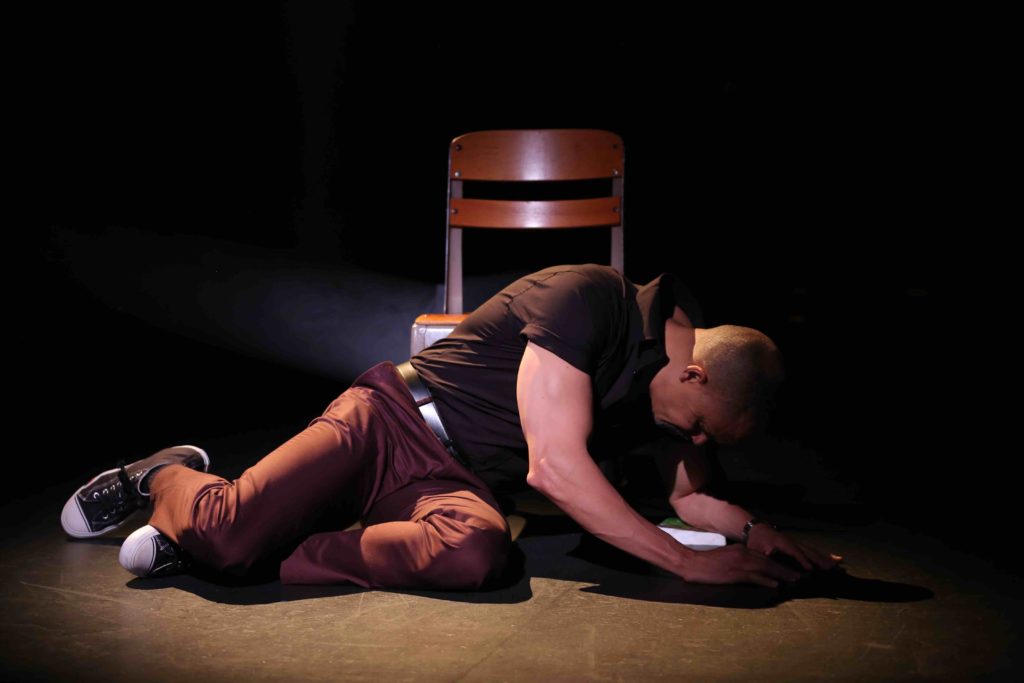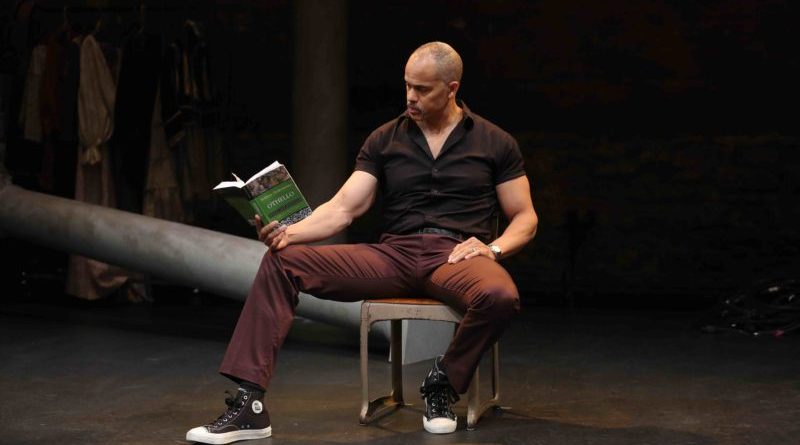INTERVIEW: ‘American Moor’ explores issues of race, perspective, theatrical interpretation
Photo: Keith Hamilton Cobb wrote and stars in American Moor, a new play that looks at interpreting William Shakespeare’s Othello. Photo courtesy of Carol Rosegg / Provided by O&M DKC with permission.
Keith Hamilton Cobb wrote and stars in the new play American Moor, which is being presented by Red Bull Theater through Oct. 5 at the Cherry Lane Theatre in New York City. In the show, audiences experience an audition for the role of Othello by an African-American actor (Cobb) for a white director (Josh Tyson). What transpires in the drama provides a commentary on the state of American theater, the state of American society and the yearning to become fully visible.
“Everybody is, in some respect, an other,” Cobb said, referencing one of the central themes of William Shakespeare’s Othello. “Everybody unto themselves and not fully understood, not fully embraced by anyone else. I think nowhere is that really more so than within the African-American diaspora in this country.”
Cobb, a graduate of New York University’s Tisch School of the Arts, said the play arose from a situation in his professional life a number of years ago. After the episode, he came to a full realization of how he and his acting talents were being perceived and understood.
“And like any actor does, I learned to deal with that and make sense of that and get on with life, irrespective of how that panned out, and in this particular instance, I was really rather inconsolable,” Cobb said of the situation. “I wasn’t able to put it down, and I began to write about it. And this piece sort of came out of that.”
The performances at the Cherry Lane have been going well, Cobb said, and audiences have been moved by the drama on stage. The actor finds that theatergoers want to respond to the piece and offer their own insights, which he finds to be a positive development.
Tyson came to the show a few years ago. The two actors had worked previously together, so Tyson was asked to be the director in the show. At that point in American Moor’s evolution, the role of the director was a disembodied voice emanating from a microphone in a booth.
“Our next step was to take it to the Shakespeare’s Globe,” Tyson said. “The Globe was having their first-annual Shakespeare and Race festival, and one of the problems we came into is we were at the Sam Wanamaker Playhouse, which is a smaller venue at the Globe. It does not have any PA system or any sound system or anything like that, so by necessity we were required to do something about that. Kim [Weild], our lovely director, she decided to put me in the house amongst the audience, and so we took the role of the director from this disembodied voice … and we put it in physical form into a person.”
The character has remained visible ever since, including runs in D.C., Boston and now New York City.

To understand American Moor one doesn’t need to know Othello, but it helps to come in with previous knowledge of the Bard’s tragedy and the story of Othello, Iago and Desdemona. Interpreting the controversial play, in particular the title character, has kept actors, directors and dramaturges busy for hundreds of years, and within this interpretation is where American Moor resides.
“The idea that one needs to have some advanced familiarity with Shakespeare, how Shakespeare is done, or Othello, in order to appreciate American Moor has not been our experience, and I think that it is because the play is in a way front-loaded,” said Cobb, who has appeared in All My Children, Andromeda, The Young and the Restless, and Noah’s Arc. “What I mean by that is what people begin to get immediately is the experience of this African-American actor on stage as a human being, and then they start to realize that he’s drawing comparisons with a character in a Shakespeare play. And because they have already begun to understand him as a human being, they then begin to understand at least his interpretation of Othello.”
He added: “Even if they haven’t read the play, it is very clear what the argument is that is being made from the very beginning, and the play has a prologue where the actor is talking to him about his human-American, African-American experience as a man and as an actor, which is very embracing and fun. They enjoy that ride, so that by the time he goes into his audition, and we’re talking more specifically what interpretation of Othello is better, they are on board and they clearly understand. So it has never been a note from people in our audience that because they had never read Othello that they didn’t understand or appreciate this play.”
Tyson said he has learned a lot from his many performances in American Moor. For starters, he realizes now that he cannot fully comprehend the life of another person and the impact of systemic racism, and certain lines that Cobb has written have stuck with him.
“Keith has lines in there, ‘The blind does not see you. He sees all the hovering inner forces that have made you you because they are the same forces that never allowed me to be me. I judge one duly. I know your intentions are good, young man,’” Tyson said. “And then finally toward the end he says, ‘I’m accusing you of not knowing what you couldn’t possibly know and just wanting you to admit that you don’t know it.’ So for me the experience has been a really huge eye-opening experience.”
Tyson considers himself a liberal and open-minded person, but he recognizes now that he is part of a larger system that is “constructed to permeate this racism in our society and our culture.”
“And so even though I might not think that I’m racist, I find myself doing things that I don’t even know because I’m part of the system that has made me me and not allowed a black man to be him, and so, yeah, I’m forever changed by this experience,” he said. “Keith calls it an ‘oblivious insensitivity,’ and I think that’s where the key lies for me, thinking that I am sensitive when in reality I’m not really. … A white person can never really know what a black person is going through, and even more so an individual can never know what another individual is going through. So it’s always been challenging me to continue to go deeper and to continue to be more open than I think I already am.”
Cobb, who is receiving critical acclaim for his words and his performance, said each and every creative experience he has been involved in has opened himself up to infinite learning. And he welcomes that transformation.
“There’s infinite learning about each other,” Cobb said. “There’s infinite learning about the process I have. There’s been such a learning curve in just mounting a piece like this. In my career, I have been a gig-to-gig actor, whether it be TV or film or stage. You get the job, you go, and a month later, two months later, you’re done, and you go do something else. But to pick up a piece, to evolve it, to run with it, to try to keep all the pieces in place to keep moving it forward, to get it to where it needs to be …”
He added: “I think this particular piece, and I don’t say this about anything else in my career or my body of work, is extremely important to us as Americans, and it speaks to our culture in a way that I don’t see anybody doing. I think it has the potential to teach and generate conversations that I don’t see other pieces doing. I don’t very honestly know how I wrote it. I don’t think it reflects the level of my writing. I think it’s generally better than me, so my job becomes a duty to promoting it and keeping it moving and growing and exposing it to a wider and wider audience. And that process has been very eye-opening.”
By John Soltes / Publisher / John@HollywoodSoapbox.com
American Moor, written by Keith Hamilton Cobb and starring Cobb and Josh Tyson, plays through Oct. 5 at the Cherry Lane Theatre in New York City, courtesy of Red Bull Theater. Click here for more information and tickets.

